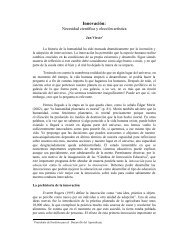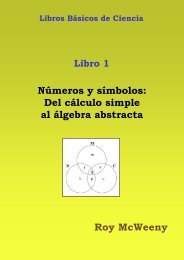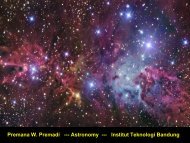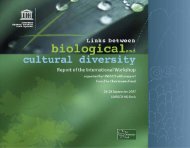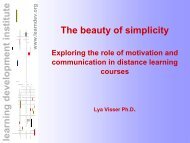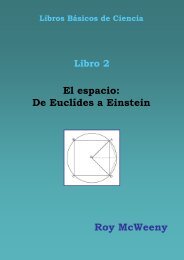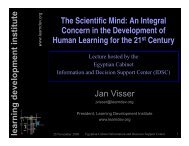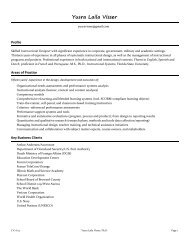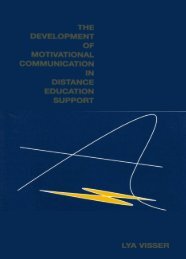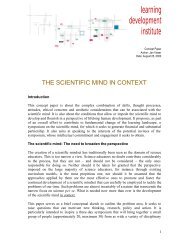The planet we live on: The beginnings of the Earth Sciences
The planet we live on: The beginnings of the Earth Sciences
The planet we live on: The beginnings of the Earth Sciences
- No tags were found...
Create successful ePaper yourself
Turn your PDF publications into a flip-book with our unique Google optimized e-Paper software.
Chapter 4Major geological events fit into atimeline, beginning with <strong>the</strong>formati<strong>on</strong> <strong>of</strong> <strong>the</strong> <strong>Earth</strong>4.1 <str<strong>on</strong>g>The</str<strong>on</strong>g> origin and development <strong>of</strong> lifeWilliam Smith was a canal engineer who supervised <strong>the</strong> excavati<strong>on</strong> <strong>of</strong> boat canals acrossEngland in <strong>the</strong> late 1700s and early 1800s. When cuttings for <strong>the</strong> canals had to be madethrough hilly areas, he noticed that <strong>the</strong> layers <strong>of</strong> sedimentary rock always formed <strong>the</strong> samesequence. He also noted that <strong>the</strong> same layers always c<strong>on</strong>tained <strong>the</strong> same fossils and that<strong>the</strong> sequence <strong>of</strong> fossils was always <strong>the</strong> same. He called this his ‘Law <strong>of</strong> Faunal Successi<strong>on</strong>’and this helped him to link toge<strong>the</strong>r rocks from different parts <strong>of</strong> <strong>the</strong> country because <strong>the</strong>yc<strong>on</strong>tained <strong>the</strong> same fossils. This is a method <str<strong>on</strong>g>we</str<strong>on</strong>g> now call correlati<strong>on</strong>. By correlating rocksequences across <strong>the</strong> country, Smith was able to produce a geological map <strong>of</strong> England andWales (shown in Figure 4.1), <strong>the</strong> first geological map <strong>of</strong> a country ever produced (althoughgeological maps <strong>of</strong> smaller areas had previously been made in Europe).Smith knew that fossils occurred in a certain sequence in rocks - but he didn’t knowwhy. In fact most people at that time (with <strong>the</strong> excepti<strong>on</strong> <strong>of</strong> a few scientists) didn’t evenquesti<strong>on</strong> <strong>the</strong> meaning <strong>of</strong> <strong>the</strong> fossils in rocks, believing that all rocks had been formed,with fossils inside some <strong>of</strong> <strong>the</strong>m, during creati<strong>on</strong> a few thousand years before. It wasn’tuntil Charles Darwin proposed his <strong>the</strong>ory <strong>of</strong> evoluti<strong>on</strong> by natural selecti<strong>on</strong> that a reas<strong>on</strong>for <strong>the</strong> sequence <strong>of</strong> fossils in <strong>the</strong> rock was provided. Darwin published his book, ‘On <strong>the</strong>origin <strong>of</strong> species by natural selecti<strong>on</strong>’ in 1859, basing it <strong>on</strong> his reading <strong>of</strong> o<strong>the</strong>r scientificpublicati<strong>on</strong>s and a mass <strong>of</strong> geological and biological evidence he had collected himself.He realised that when plants and animals reproduce, <strong>the</strong>y produce new young organisms,some <strong>of</strong> which are better adapted to <strong>the</strong> envir<strong>on</strong>ment than o<strong>the</strong>rs. Through ‘naturalselecti<strong>on</strong>’ <strong>the</strong> best adapted <strong>on</strong>es survive and <strong>the</strong> less <str<strong>on</strong>g>we</str<strong>on</strong>g>ll adapted <strong>on</strong>es die. This meansthat slightly different, better-adapted organisms develop and, if this c<strong>on</strong>tinues, wholenew types <strong>of</strong> organisms can form as <strong>on</strong>e species develops into ano<strong>the</strong>r through evoluti<strong>on</strong>.This explains why different rocks c<strong>on</strong>tained <strong>the</strong> different fossils that William Smith had97



